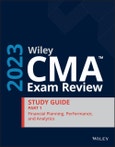Prepare for success on the first part of the 2023 CMA exam with this essential study aid
The Wiley CMA Exam Review 2023 Study Guide Part 1: Financial Planning, Performance, and Analytics is a comprehensive and accurate handbook designed to help you identify and master each of the competencies covered by the first part of the 2023 Certified Management Accountant (CMA) exam.
This proven and effective guide includes all required learning objectives on:
- External Financial Reporting Decisions
- Planning, Budgeting, and Forecasting
- Performance Management
- Cost Management
- Internal Controls
- Technology and Analytics
Ideal for anyone preparing for the challenging Part 1 CMA exam, the Wiley CMA Exam Review 2023 Study Guide Part 1: Financial Planning, Performance, and Analytics is also a perfect companion resource for early-career management accountants seeking a refresher on foundational topics they’re likely to encounter regularly at work.
Table of Contents
About the Instructors ix
About the Exam xi
Introduction xiv
Section A. External Financial Reporting Decisions 1
Topic 1. Financial Statements 2
Overview of Financial Statements and Income Statement 2
Statement of Changes in Equity and Balance Sheet 11
Statement of Cash Flows and Financial Statement Articulation 17
Integrated Reporting 25
Topic 2.1 Recognition, Measurement, Valuation and Disclosure - Assets 31
Receivables 31
Inventory 37
Accounting for Investments in Other Entities 47
Long-term Assets 55
Topic 2.2 Recognition, Measurement, Valuation and Disclosure - Liabilities 63
General Liabilities 63
Leases 67
Topic 2.3 Accounting for Income Taxes and Revenue Recognition 73
Accounting for Income Taxes 73
Revenue Recognition 79
Topic 2.4 IFRS Differences 87
IFRS Differences in Accounting 87
Section A Review Questions 91
Section B. Planning, Budgeting, and Forecasting 95
Topic 1. Strategic Planning 96
Strategy and SWOT 96
Strategic Objectives and Generic Strategy 101
Specific Strategy Tools 105
Topic 2. Budgeting Concepts 111
Strategy Implementation and Budgeting 111
The Budgeting Process 115
Building Budget Standards 119
Topic 3. Forecasting Techniques 123
Regression Analysis 123
Expected Value Computations and Learning Curve Analysis 129
Topic 5. Annual Profit Plan and Supporting Schedules 135
Sales Budgets and Production Budgets 135
Budgeting for Production Costs 141
Wrapping Up Operational Budgeting 149
Capital Expenditures and Cash Budgets 157
Topic 4. Budget Methodologies 165
Comparing Flexible, Rolling, Activity-Based, Zero-Based, and Project Budgeting 165
Topic 6. Top-level Planning and Analysis 175
Pro Forma Financial Statements 175
Section B Review Questions 185
Section C. Performance Management 189
Topic 1. Cost and Variance Measures 190
Flexible Budgets and Performance Analysis 190
Sales Revenue Variances 197
Direct Material and Direct Labor Cost Variances 207
Factory Overhead Cost Variances 217
Management Work with Variance Analysis 225
Topic 2. Responsibility Centers and Reporting Segments 233
Business Units and Performance Evaluation 233
Transfer Pricing 241
Topic 3. Performance Measures 251
Evaluating Product and Customer Profitability 251
Return on Investment and Residual Income 259
The Balanced Scorecard 267
Section C Review Questions 275
Section D: Cost Management 281
Topic 1. Measurement Concepts 282
Cost Drivers and Cost Flows 282
Variable Costing versus Absorption Costing 289
Joint Product Costing 299
Topic 2. Costing Systems 309
Job Order Costing 309
Process Costing 315
Activity-Based Costing (ABC) and Life Cycle Costing 323
Topic 3. Overhead Costs 335
Support Department Costing 335
Variable and Fixed Overhead Costs 345
Topic 4. Supply Chain Management 353
Inventory Management and Production Systems 353
The Theory of Constraints 359
Managing Capacity 367
Topic 5. Business Process Improvement 373
Creating and Capturing Value 373
Managing Quality 379
Section D Review Questions 387
Section E: Internal Controls 391
Topic 1. Governance, Risk, and Compliance 392
Internal Control Structure and Management Philosophy 392
Internal Control Policies for Safeguarding and Assurance 395
Internal Control Risk 399
Corporate Governance 401
External Audit Requirements 403
Topic 2. Systems Controls and Security Measures 407
Information System General Controls 407
Information System Application Controls 413
Section E Review Questions 417
Section F: Technology and Analytics 421
Topic 1: Information Systems 422
Accounting Information Systems 422
Enterprise Resource Planning Systems 425
Enterprise Performance Management Systems 427
Topic 2: Data Governance 429
Data Policies and Procedures 429
Life Cycle of Data 433
Controls Against Security Breaches 435
Topic 3: Technology-Enabled Finance Transformation 437
System Development Life Cycle 437
Process Automation 439
Innovative Applications 441
Topic 4: Data Analytics 443
Business Intelligence 443
Data Mining 445
Analytic Tools 447
Data Visualization 451
Section F Review Questions 453
Review Questions and Answers 457
Appendixes 491
ICMA Content Specification Outlines 491
ICMA Learning Outcome Statements 498
Time-Value of Money Tables 513
Essay Tips 518
CMA Exam Ratio Definitions 520
Index 523








